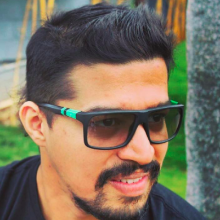Mahesh Murthy - Pin Drop Storm
By - CrazyEngineers • 15 years ago • 35k views
He has been there, done that. He got into engineering college but dropped out after 3 semesters. He sold vacuum cleaners door to door and later went on to shape & design Yahoo’s first GUI, shape Amazon.com’s strategy & launch Paul Allan’s net properties. He currently heads one of the top 10 coolest companies in India and and funds exciting startups through his passionfund! He is probably the only venture capitalist who advises startups against raising venture capital.
He is Mr. Mahesh Murthy!
We are extremely proud and happy to have Mr. Mahesh Murthy, the Founder & CEO of Pinstorm for Small Talk with us. In Mahesh’s own words “it is one of the most exciting & exhausting interviews I have ever done”.
CE: Mahesh, from being a college dropout to a successful entrepreneur: how is the journey in hindsight?
Mahesh: I was brought up to believe that there’s a pot of gold at the end of the rainbow – that you put your head down and work hard during the journey and then finally at the end there is comfort and wealth.
I disagree with all that now. I don’t believe there’s a pot of gold at the end of the rainbow. Even if you die with Rs. 1,000 crores to your name, you don’t take the money with you. So at the end you have absolutely the same you started with – zero.
Hence I now believe that the pot of gold is not the end of the rainbow – but that the pot of gold is the rainbow itself. All that we have is the journey. There is nothing else.
And it is our responsibility as sentient beings to have as much fun, joy and new experiences during this journey.
So in hindsight, I think the journey has been great so far. It’s been only about 25 years – I can’t predict the future, but I hope whatever there is that is left will be fun, learning and a great experience going forward too.
CE: In 1982, you enrolled for a course in Chemical Engineering, and dropped out of college after 3 semesters. What were the thoughts running in your mind at that time?
Mahesh: Well, I joined engineering because I was programmed to. In the background I came from – orthodox Tamilian Brahmin - there was a well-established binary decision-tree regarding career choices. It went thus:
“If you’re good at Maths and Science, then you’ll be an engineer or a doctor. If you’re good at Maths but not Science, then you’ll do Commerce. If you’re good at Science but not Maths, then you’ll do a B Sc. If you’re not good at Science and not good at Maths, then we have to find you someone rich to marry.”
Being somewhat well conversant with Maths and Science, I was told I was lucky- I had a choice – Engineering or Medicine. All I remember then thinking was, “Hey, I don’t like the sight of blood on people – so I guess I can’t cut them open, so I guess I can’t be a doctor. Then I must be cut out to be an engineer”.
So, engineering it was. Till I got to college. And then I figured that there was nothing remotely interesting in engineering for me. There was very little application of logic, of thinking or of intelligence. There was more learning by rote, which I knew I was not cut out for. I still think anything that needs learning by rote is a failure of either the subject, or the teacher, or both.
And when I asked my classmates what they thought they seemed to say hey just shut up, learn the stuff and graduate – don’t ask questions. I was really depressed that this supposed dream career in engineering just didn’t excite me. My life was stuck in a rut – and I was listening to a lot of moody Rock music at that time.
One song in particular, seemed to mock me, and I played it dozens of times on an old LP. It was “Time” from Pink Floyd’s “Dark Side of the Moon”. The lyrics seemed to be written just for my state of mind:
Ticking away the moments that make up a dull day
You fritter and waste the hours in an offhand way
Kicking around on a piece of ground in your home town
Waiting for someone or something to show you the way
Tired of lying in the sunshine staying home to watch the rain
You are young and life is long and there is time to kill today
And then one day you find ten years have got behind you
No one told you when to run, you missed the starting gun…
And so on. Every time I played it, I felt that I was doing nothing but “kicking around on a piece of ground in my home town”.
I guess I then decided that I needed to do something. And the only positive move I felt I could do was to stop this mockery of college that I was supposedly going to.
I did that. Stopped going to college.
The rest followed, quickly and (in hindsight logically, but at that time, unpredictably). My parents and grandparents took objection to my stopping college. My family gave me an ultimatum – “if you want to live within our 4 walls, follow our rules and go to college.”
I bought their point – I had no right to live my life in their house – so I left home that very evening. I didn’t have too much with me – just a few thousand rupees of scholarship money I had earned by being a NTSE scholar. I checked into a cheap run-down hotel that then charged Rs. 50 a night and bought the Deccan Chronicle the next morning.
The only job ad it had that did not demand a graduate degree was one from Eureka Forbes, selling vacuum cleaners from door to door. I went for the interview and they hired me – I knew next to nothing about selling. And of course, I knew my parents would be mortified – an educated Brahmin boy doing door-to-door selling – oh God! The horror!
But, I was quite determined that I had to show dignity of labour – and that no job was unworthy and that I had to give anything and everything a fair shot. So I talked myself into that job.
I did later discover that I was a truly mediocre salesperson – but that’s another story!
CE: At the age of 19, you were running your own business: vacuum cleaning service & you became door-to-door salesperson. How did your family & friends react? How did you handle it all?
Mahesh: Well I started off as a door-to-door salesperson and soon discovered I was not cut out to be a good one – I guess then I had too much empathy for the customer and too little “killer instinct”. Though I guess on the plus side I did learn more about marketing and sales than a dozen business schools can teach you.
One of the constant objections of prospects was that a vacuum cleaner then had limited utility for them as it was useful for carpets and curtains – and they couldn’t imagine making a huge capital expense of Rs. 3,300 (which was then about one month’s salary for the average middle class family). Many of them asked if the company offered a vacuum cleaning service – they were happy to pay Rs. 100 or even Rs. 200 a month then for someone to come and clean their carpets etc once a month.
The company absolutely didn’t want to do this even after our repeated requests – so two of us from the company thought we would – and we went and started, or I should say, tried to start a vacuum cleaning service called Vaclean. In creating brochures for the business I first discovered the joys of writing and design.
Eventually the business never really got off the ground much – but certainly I figured I liked writing and designing persuasive communication and tried to start a design firm – which also failed!
The first failure was because of lack of focus on building clients and the second failure was because I never put focus on billing, following up and collecting monies due.
That however led to me joining an advertising firm as an employee – which was the first career stability that I ever had.
By now my parents were actually happy to see me in a job – they were earlier resigned to much worse – so this was a definite move up in their eyes.
My friends were jealous – I was the guy who broke all the rules and actually made out well – I dropped out of college and left home- but in a couple of years I ended up in a job, which paid well, I had my own motorbike, I had a few girlfriends, all of whom knew each other and were cool about it, I had my own place to live etc. And all this while they were mugging for their B Tech finals. They felt it was unfair – I was not supposed to end up well after breaking all the rules. ? I guess I was supposed to be the bad example for them but I was refusing to play my designated role ?
But one thing I can say – my friends stood by me when my family didn’t. This lesson has stayed with me for a long, long time. For me what matters is not who is by you when times are good – but who stands by you when times are bad – I know my friends did when my family didn’t and I have lived my life knowing that at the back of my mind.
I guess your friends love you for who you are and your family loves you – in many cases – for who they want you to be.
My friends from back then – 25 years ago – are still the ones I hold dearest to me.
CE: You have helped Yahoo! with its first graphic UI & branding in 1995. You have also helped create & launch “World’s Biggest Bookstore” campaign for Amazon.com. Could you please tell us more about your work with these biggest brands on the Internet?
Mahesh: After a career in advertising that took me from Hyderabad to Bombay to Delhi to Hong Kong over 10 years, I landed up in the US in an interactive agency that was based out of Silicon Valley. (The one thing for you to note here is that, yes, you CAN get a H1 visa if you’re 12th class pass and not even a graduate, let alone a post-graduate!)
Anyway, back to the work… Yahoo came to my firm, CKS Partners in mid-1995 and asked if we could help them. They had a loooooong list of text links on their home page – and I spent a huge amount of time actually categorizing all of those links into some sort of groups and hierarchies – it was like cataloguing all human knowledge into categories.
The existing systems of cataloguing information – Dewey Decimal etc did not work – as we tried to categorise all websites based on topics as well as number of sites in that topic and the amount of traffic to the sites. You can imagine we had to make a lot of room for sex-related content back then!
Well, more than just the re-design – or actually it was the first graphic design of Yahoo – see it here: (https://web.archive.org/web/19961017235908/https://www2.yahoo.com/) what was interesting was what we did and how we introduced it to the public.
Jerry Yang and David Filo were really scared that their college audience and Grateful Dead-like fan following would think they had sold out. So every decent design we did for Yahoo was rejected. So we then tried very hard to make the design look college-kid like. I remember asking my designers to deliberately make the icons look ugly and childish, and to avoid anything that looked elegant or professional! It had to look like it wasn’t designed by experts but by an untrained college student. We had to maintain the pretense that it was still a company running from a Stanford dorm though they were all venture funded and grown up now.
The second thing was how we launched the new UI for Yahoo. We put it up in parallel on a link on the original page and then asked people to try it out (like we were taking their opinion first) for a few days.
Tens of thousands did- we did a survey amongst them and incorporated a few suggestions they came up with and went back to the community and said that hey – this is the design you looked at and approved – and only then did we change the home page to the new design. We always maintained the presence that it was a user-approved and tested page even when we knew what we were always doing and what we wanted to have happen.
The Yahoo re-design was a big success – it doubled the page views in just a few weeks and soon became a case study for us.
We then won the Amazon.com business. I remember then going to meet Jeff Bezos and gang when they were 8 people in south Seattle, sitting on upturned apple crates. Jeff had an unused door turned on its side as his desk.
I remember the arguments I had with Jeff on two issues. One, on the logo and the other on the positioning of Amazon.com
The logo Jeff had was the letter “A” with a river flowing through it. I strongly felt that if Amazon was a bookstore then the river Amazon was not the right metaphor, but the Amazon rainforest was the right metaphor, with its wildness, diversity of life forms etc. We fought in vain and Jeff insisted that he wanted the river as Amazon was going to be the high volume provider of many things and it wasn’t about diversity.
Within years, and on seeing how Amazon grew, I knew that he was right and I was wrong and I learnt from how he held on to his beliefs.
The second argument with Jeff was one that I fortunately won. He wanted to position Amazon as the leading online bookstore against other online bookstores. Then the only other online bookstores then were I think Books.com and someone else out of Boston or England. He wanted to say he was better than them.
I argued that to be seen as the leading online bookstore, we should not visibly take on other online bookstores, but that we should be seen to take on terrestrial bookstores and say that we’re as big or bigger than them. This would automatically set us apart in people’s minds as the leading online bookstore.
This was an outrageous recommendation, given how big and respected Borders and Barnes & Noble were then and I argued that this “taking on the Goliath” would give us the kind of publicity that taking on Books.com would never be able to. I finally convinced him.
We created a campaign around this called “Earth’s biggest bookstore” and we demonstrated it through ads like “864 books on golfing and, just in case, 1,165 on divorce. Amazon.com. Earth’s biggest bookstore” We ran these in print and online. All were funny, and made a point that you could choose from over a million books on Amazon while the average terrestrial bookstore just had about 25,000.
Sure enough, a huge controversy brewed up with Barnes and Noble suing us saying they were many times our size etc, we responded saying it wasn’t about revenues but about the number of books customers could see and buy etc.
Thankfully we won consumer hearts, lots of free editorial space and that PR battle and Amazon.com never looked back after that positioning. I was really proud of the work I and my team did on the brand – and I still am.
CE: What is your take on present education system?
Mahesh: At the school level in some tiny elitist pockets of India, it is improving. My son goes to a school in Bombay that is fantastic and that I wish I could have gone to.
But for a large chunk of India, it is still as pointless as ever. We talk of our great Indian education system that has created so many qualified people and I think that all it has perhaps created is a billion mugpots.
We have trained our students to learn without thinking, to study without understanding and to answer without processing. This is fine to create more people bound for BPOs – but it is a recipe for disaster if we want a generation that can think for itself and take calculated risks.
The same is true not just for schools but also for our engineering colleges and our MBA colleges – nowhere are you taught to think – in every case you are trained to work in brain-dead mode and become part of somebody else’s company.
So what of entrepreneurs? In this environment we will create entrepreneurs not because of the system – but in spite of it.
If you are a student, your best bet in India is to not take this education seriously – it is not worth the degree you are going to be awarded – but instead to use the time to have fun, enjoy – and to dream about whatever you love and to work towards making your dreams come true. If it means dropping out, so be it – you’ll start on your road faster than your peers and you will end up far ahead of them.
As advice to students, I can offer this: Forget about topping class – toppers don’t end up anywhere important in life. Study but only at the last possible moment and just enough to pass your exams if you HAVE to get your degree or whatever. But don’t waste even one minute more than necessary on anything academic or anything related to what you have to study – unless you want to become an academician or a researcher.
CE: What are the important questions any aspiring entrepreneur should try to answer before taking the plunge?
Mahesh: There are many kinds of entrepreneurs – business entrepreneurs, social entrepreneurs, even philosophical entrepreneurs.
Assuming we’re talking about business entrepreneurs, I’d say that your journey begins first with the fire in your belly to make a difference. If that is not there, don’t even bother. Don’t become an entrepreneur because it’s fashionable – just like the thousands who learnt programming because it was the in-thing, or the thousands who went to BPOs because it was the in-thing or the thousands who went abroad because it was the in-thing. All of them are leading wasted lives somewhere on the planet.
You cannot become an entrepreneur if it’s the in-thing - as it now seems to be because the dumb American companies like Goldman / Lehman etc have stopped hiring fools at large salaries from campuses. You have to have the fire that makes you resist joining a job.
If that is there then the next thing you need is a problem to solve. Some big problem out there you have personal knowledge of. And that you want to solve. And that you have the crazy drive, will and passion to solve.
After identifying a problem – you need to figure out that you have the solution for it. Ideally it’s a solution that causes insane customer delight, and it’s a solution that others cannot easily replicate. Delight because that’s what causes businesses to grow – and what propels positive word-of-mouth. And hard-to-replicate is what creates your sustainable competitive advantage.
After the problem and the solution you need a third thing – a way to make a business out of it – that is, to find people who will pay you for your solution more than it will cost you to produce and manage the solution.
After this comes the team that will help you figure out the above and implement the above.
Once you have this all – and business is really so simple – then you’re on your way!
CE: What would you advise to engineering students / professional engineers who think “I’ve a great product/service/business idea but I’ll work with MNC for 4-6 years (or get a higher degree), gain experience & gather enough money to quit and start my own venture.”?
Mahesh: The best experience you can gain that is relevant to a startup is experience in the market you want to be in. i.e. you cannot join an investment bank and then leave after 4 years to start a restaurant – there are no relevant experiences gained here and you are fooling yourself if you belief that your experience is of any real value. Experience for its own sake is meaningless.
So if you are going to take a job take one – ideally, customer-facing – in the line you want to start your own business in. Else, don’t delude yourself that your experience means anything.
The second delusion is “save up money for it”. Today your MBA is likely to cost you money. And you’ll have a loan on it. By the time you pay off your loan, you won’t have any savings left. So don’t fool yourself here.
Even if you don’t have the paying-off-a-loan issue, believe me, your expenses will quickly rise to meet your income and you cannot make any meaningful savings in the first few years of your career. Perish the thought.
On the other hand, starting a business takes very little money and the earlier you do it the better. Frankly, how much does it take you to survive if you have a roof over your head and food on the table? Maybe not even Rs. 10,000 a month. So live at home and spend as little as possible, get a few people together who share your dream and start off.
The best funding you can get is revenues from customers.
Don’t delay it.
Or you’ll be competing with your classmate who started off right after school – while you wasted 5 or 6 years after that getting an education that is worthless – and he is going to be 6 years ahead of you by the time you hit the start of the race.
CE: You are a venture capitalist and yet, you advise not to go for venture capital? You have also advised against having plan-B (the backup plan) while starting a venture.
Mahesh: Think of the entrepreneurs you admire: Ambani / Tata / Narayanamurthy / Branson / Jobs / Gates / Dell / whoever.
They all started without venture capital.
That is the most common way to be successful – yes it is harder – but when you start with no funding then you focus quickly on delivering a sustainable competitive advantage and on making money early on – which all of these people did. And hence they landed up with great businesses. And none of these people had a plan B. They had no choice to be successful.
That is the best way to be successful.
The second best way is to take money from someone else, like a VC. But it does come with drawbacks in that it can make you fat, rich and lazy and in all these cases you must beware of the un-funded person who has a greater fire than you to defeat your company in business.
CE: What are the biggest lessons you have learned from your varied experiences?
Mahesh: It’s too soon to do a life summary. I am just 43 and I am still learning. There’s still more to my life, I hope.
But what I’ve learnt till now is this: Follow your heart. When the heart doesn’t know, follow your gut. Don’t, in any circumstances, follow your mind. In no circumstances, whatsoever, follow a SWOT analysis that B-school asked you to do. That is the worst possible way to take a decision on your lfie.
CE: We thank you for spending time with us. What is your advice to our CEans?
Mahesh: The reports on life-after-life and punarjanam (rebirth) are unreliable. Currently, we all have to assume the worst case that there is just one life we have.
We came with nothing and we will all die and go with nothing.
Our only asset is the statistically indicated 70 or 75 years of time we have (more for women, by the way, than men the numbers tell me).
Our only responsibility, hence, is to live the fullest 70 years of life that we can, packing it in with every possible experience, emotion, every bit of love, adventure, happiness and exploration that our souls demand. And to live it with no regrets whatsoever.
Don’t live it for another- be selfish – live it for yourself. Don’t live it for your parents or your family or your girlfriend or boyfriend or your spouse or your kids. All those people will automatically be happy when you are happy – not the other way around.
Have a full life and die happy.
Have fun, all of you. There is nothing else worth living for.
Replies
Note: Only logged-in members of CrazyEngineers can add replies.
Recent updates

We understood the client’s need of going mobile friendly and making solutions that will help save time and money. That is how our direction of being known as one of India’s best enterprise mobility solution provider became an aim.
Abhijit JunagadeWinjit Technologies

In 10 years, when I go to a hackathon and ask, “Who here has used Postman?” - I want every hand in the room to go up.
Abhinav AsthanaPostman

An entrepreneur’s life is full of decision points. He shouldn’t be afraid of taking wrong decisions.
Abhinav PrateekMetamorf

Competencies can be build and nurtured. But right ambition, right motivation and cultural fit is very imp. I will suggest all entrepreneurs in early years to codify it.
Abhishek BallabhExtraaEdge

People management, analytical and not emotional driven business decisions is the key.
Abhishek DagaThrillophilia
